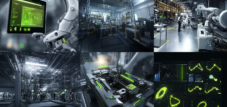AI-based optimization in the machine device in industrial production: up to 80% savings with machoptima
Xpert pre-release
Language selection 📢
Published on: June 26, 2025 / update from: June 26, 2025 - Author: Konrad Wolfenstein

AI-based optimization in the machine facility in industrial production: up to 80% savings with Machoptima-Image: Xpert.digital
A shortage of skilled workers and cost pressure: How artificial intelligence determines the future of production
From the cost trap to the efficiency revolution: AI as a gamuchanger in modern production
Modern industrial production is faced with unprecedented challenges that require a fundamental realignment of traditional manufacturing approaches. Rising production costs, intensive global competitive pressure, the acute shortage of skilled workers as well as volatile energy prices and supply chain problems force companies to drastically rethink and optimize their production processes. In this complex environment, artificial intelligence proves to be a transformative key technology, which not only enables efficiency increases, but also opens up completely new dimensions of process optimization.
The central role of the machine equipment in modern production
The machine equipment forms the foundation of every industrial production chain and is one of the most important activities of work preparation in manufacturing technology. This critical phase significantly determines the quality, efficiency and economy of the entire subsequent production. Industrial mechanics, mechanical and plant drivers as well as specialized diggers have an enormous responsibility, since their work has a direct impact on the product quality and the overall efficiency of the manufacturing processes.
Core tasks and challenges of the traditional machine equipment
The machine equipment includes a variety of complex and time -consuming activities. First of all, the appropriate tools for the respective production task must be selected and precisely assembled. Then the setting of the machine parameters such as speed, feed, temperature or pressure requires a profound understanding of machine technology and material properties. The implementation of test runs and calibrations is essential to ensure optimal functioning before the actual production can begin. Finally, any errors have to be remedied and fine -tunes have to be made in order to achieve the desired product quality.
The traditional approach to these tasks is often based on experience, intuition and time-consuming trial-and-terrorist procedure. Machine designers have to try out various parameter combinations, evaluate and gradually optimize the effects. This process can take several hours or even days, especially with complex manufacturing tasks or new product variants. During this time, the production facilities stand still, which leads to significant loss of productivity and cost increases.
Processual classification and industrial importance
The machine device is an integral part of the preparation phase of every production process and acts as a critical link between strategic production planning and operational production. It is closely interlinked with process technology, quality assurance and material management. Errors or inefficiencies in the furnishing phase have a direct impact on the downstream production processes and can lead to quality problems, committee or rework.
In the modern Industry 4.0 environment, the machine facility is becoming increasingly a strategic success factor. The ability to configure machines quickly, precisely and inexpensively for new manufacturing tasks determines the flexibility and responsibility of a company on changing market requirements. Companies that can reduce their set -up times are able to manufacture smaller lot sizes economically and thus offer customer -specific products.
The revolution through AI-based process optimization
Artificial intelligence transforms the way industrial processes analyzed, understood and optimized. In contrast to traditional approaches based on human experience and linear optimization processes, AI-based process optimization uses complex algorithms, machine learning and advanced data analysis methods to understand and improve production processes as a whole.
Paradigm shift in process optimization
The use of artificial intelligence in production technology brings with it a fundamental paradigm shift. While traditional optimization approaches are often based on technological experiments or simulation -based processes, machine learning enables the identification of patterns and relationships in production data that were previously not recognizable. This ability is particularly advantageous in production technology, where hybrid learning approaches can significantly reduce the experimental effort for understanding and improving production processes by combining data-based ML models with physical and domain-specific knowledge.
Modern AI systems are able to analyze huge quantities of production data in real time and derive precisely predict and derive proposals. These data include machine temperatures, production times, error rates, material consumption, energy expenditure and many other parameters that are continuously generated by modern production facilities. By analyzing these data flows, AI algorithms can recognize complex relationships between different process parameters and identify optimization potential that are not obvious to humans.
Efficiency increase through intelligent data analysis
A central advantage of AI-based process optimization is the ability to derive concrete recommendations for action from the analysis of large amounts of data. Modern production systems continuously generate data about their operating states, which have traditionally only been used to a limited extent. AI systems can systematically evaluate this data, identify hidden patterns and develop suggestions for improvement based on them.
The integration of expert knowledge plays a crucial role in this. The combination of data -driven modeling techniques with specialist knowledge not only increases the accuracy of model forecasts, but also enables better interpretability of results, which leads to increased acceptance and more trust among users. This interdisciplinary cooperation between data sciences and manufacturing technology enables complex challenges from several perspectives to be considered and developing innovative solutions.
Machoptima: Pioneer of AI-based industrial optimization
Machoptima represents the top of technological innovation in the field of AI-based process optimization. As a spin-off of the renowned Max Planck Institute for Intelligent Systems, the company embodies the successful translation of basic research into practical industrial applications. The Max Planck Institute for Intelligent Systems, with its locations in Stuttgart and Tübingen, combines interdisciplinary top research in the growing research area of the intelligent systems. The expertise of the institute in the areas of machine learning, robotics, material sciences and biology forms the scientific basis for machoptimas innovative technologies.
Scientific excellence as a foundation
The founders of Machoptima, Dr.-Ing. Sinan Ozgun Demir and Saadet Fatma Baltaci Demir, M.Sc., have profound scientific expertise and practical experience in the development of intelligent systems. As part of Max! Mize, the official start-up incubator of the Max Planck Society, Machoptima benefits from a unique ecosystem from scientific excellence, technological innovation and entrepreneurial support.
Germany has established itself as a leading location for spin-off companies, with a significant growth of 6,800 start-ups at the end of the 1990s to more than 20,000 in 2014. This development underlines the successful transformation of scientific knowledge into practical applications and economic success. Spin-offs contribute significantly to knowledge and technology transfer and create new jobs in future-oriented industries.
Revolutionary technology: non-invasive, data-efficient optimization
Machoptima's approach is characterized by its non-invasive and data-efficient methodology. In contrast to traditional optimization procedures, which often require extensive changes to existing production systems, Machoptima works with the existing systems and uses advanced machine learning algorithms to identify optimal parameter settings.
The technology is based on an intelligent combination of AI-based input parameter optimization and advanced model development. The system analyzes the relationships between different input parameters such as temperature, pressure, time duration and material composition and the resulting performance metrics such as quality, speed and resource consumption. With this analysis, the system can precisely predict the effects of different parameter settings and propose optimal configurations.
From 45 % to 0 % mistakes: How a German AI solves the biggest problem in industry

From 45 % to 0 % error: How a German AI solves the biggest problem of industry - picture: Xpert.digital
Instead of only a few clicks instead of months: how intelligent software factories set up perfectly straight away
Imagine a very complicated machine in a factory, for example one that paints auto parts or coated microchips. This machine has many “controllers” and “buttons” (parameters), such as temperature, pressure, speed, duration, voltage, etc.
More about it here:
Industrial AI success: 80% time savings through intelligent production optimization in global corporations
Impressive success stories from practice
The effectiveness of Machoptima's technology is demonstrated by an impressive collection of success stories from various branches of industry. These case studies not only demonstrate the versatility of the technology, but also their enormous potential for cost and time savings.
Bosch: Revolutionation of the microchip surface coating
At Bosch, the focus was on optimizing the surface coating for microchip production. The challenge was to achieve a protective layer coating with a failure share of less than 0.3%. The traditional approach required extensive laboratory tests with various parameter combinations for temperature, pressure, plasma pretreatment duration, impulse duration and heat treatment duration.
Machoptima's AI system analyzed the complex interactions between these parameters and identified the critical process steps that have the greatest influence on the quality of coating. The result was impressive: the destination was achieved, while 85% of the time and cost efforts were saved. The efficiency of the system is particularly noteworthy: While every traditional optimization cycle required a week of laboratory tests, the AI system only needed one minute for modeling renewal and selection of the next parameter set on a commercially available Intel i7 computer.
Mercedes-Benz: Transformation of AutoLackierung
Mercedes-Benz used Machoptimas Technology to optimize e-coating calibration for body paint. The challenge was to achieve the target layer thickness, while the number of tests was limited due to the ongoing series production. The parameters to be optimized included voltage, electricity, duration of coating and various material properties.
The Machoptima AI system also achieved extraordinary results here: The target layer thickness was achieved with about 80% time and cost savings, which led to significantly reduced downtimes. The efficiency was even more impressive than at Bosch: Each optimization cycle covered only about 2 seconds for virtual tests based on historical data as well as about 5 seconds for modeling renewal and selecting the next parameter set on a Mac with M3-Max chip.
Max Planck Institute: Precision simulation calibration
Cooperation with the Max Planck Institute demonstrated Machoptima's ability to also optimize highly complex scientific applications. The project focused on the simulation calibration and material identification for soft body simulations. The challenge was in the precise determination of damping coefficients and friction coefficients to develop highly accurate simulation models.
The result was noteworthy: a high -precision and stable simulation model was achieved, with the experiment effort limited to only 2 out of 10,000 (0.02%) of the entire search space with 9.8 million options. This drastic reduction in experimental effort while increasing the model accuracy illustrates the transformative potential of AI-based optimization.
Innovative material research: shear -optimized microsecy design
Machoptima also demonstrated its innovative strength in material research through the development of shear power -optimized microsecy design to increase adhesive strength. The project aimed to maximize the shear force by optimizing the control points of the Bezier curve and the basic diameter of the micros columns.
The results exceed the expectations: the shear performance has been improved by at least 50%, while new, non -intuitive designs have been researched that would not have been discovered with traditional approaches. This case study underlines the ability of AI to find innovative solutions that are beyond human intuition.
Digitization and Industry 4.0: The context of the transformation
The success of Machoptima feaks in the larger context of the digital transformation of German industry. Digitization in mechanical engineering has taken a significant time to react through the need to react to the challenges of Corona, supply chain disorders, international competitive pressure, shortage of skilled workers and increasing energy costs.
Challenges and opportunities of digitization
Many of the mechanical engineering companies are still reserved for digitization and only hesitantly implement appropriate measures. The production environments have often grown historically over decades, which leads to heterogeneous machine parks with systems from different manufacturers. Each machine uses various interfaces and protocols, and the connectors are sometimes completely lacking in older systems.
Despite these challenges, digital transformation has become essential. Only through continuous, comprehensive digitization of production can companies produce more efficiently, reduce costs and offer their customers innovative solutions. Digitization makes it possible to network machine parks and significantly increase productivity.
Setpower optimization as a key factor
The optimization of set -up times has proven to be one of the most important factors for increasing productivity. Set times are periods in which no production can take place between a completed order and the start of a new order because workers are busy with armory processes such as changing tools or changing the machines.
Fast preparation enables small productionless and flexible reacting to customer needs and represents a basic requirement in order to meet growing customer requirements and increase competitiveness. The Smed methodology (Single Minute Exchange of Die) aims to equip or convert machines or manufacturing lines within a production clock in order to reduce waste by waiting.
Future perspectives and potential
The success of Machoptima and similar technologies show the enormous potential of AI-based process optimization. The integration of machine learning into production technology initiates a new phase of economic and sustainable production. By automating knowledge gain and the hybrid linking of models, data sources and expert knowledge, this area offers innovative and resource -saving solutions for industrial applications.
Extended applications
Machoptima technology has potential for a variety of other applications in industrial production. In addition to the machine device, AI-based optimization process in materials management, energy optimization, quality assurance and maintenance planning can be used. Robotic Process Automation (RPA) In combination with AI technologies, manual activities can automate-from data maintenance to complex process control.
Sustainability and resource efficiency
An important aspect of AI-based process optimization is your contribution to sustainability. By reducing material waste, energy consumption and production committee, these technologies significantly contribute to improving the environmental balance of industrial processes. The possibility of optimizing production parameters precisely leads to more efficient use of resources and reduces the ecological footprint of production.
Outlook on the future of production
The future of industrial production will be largely shaped by intelligent, adaptive systems that continuously learn and optimize yourself. AI-based manufacturing planning will make it possible to react to changes in real time and dynamically adapt production processes. This development will lead to unprecedented flexibility and efficiency in production.
Specialists become system managers: AI changes jobs in modern production
Machoptima's success story impressively illustrates the transformative potential of AI-based process optimization in industrial production. With savings of up to 80% in time and costs, the technology sets new standards for efficiency and economy in production. For industrial mechanics, mechanical and plant drivers as well as bodies, this means a fundamental change in your way of working-away from time-consuming trial-and-terroric procedures to data-driven, precise optimization processes.
The non-invasive approach of Machoptima makes the technology particularly attractive for companies that want to optimize their existing production systems without major investments. The combination of scientific excellence from the Max Planck Institute and practical application shows how successful technology transfer can work.
The digital transformation of industry is no longer to be stopped, and companies that rely early on AI-based optimization technologies will obtain decisive competitive advantages. Machoptima stands as an example of a new generation of technology companies that convert scientific knowledge into practical, economically successful solutions.
The future of industrial production lies in the intelligent networking of people, machine and data. AI-supported systems such as Machoptima that will help to make production processes not only more efficient, but also more sustainable and flexible. For the specialists in production, this means an upgrading of their work - they become managers of intelligent systems that are able to understand and control complex optimization processes.
The impressive results of up to 80% savings in industrial processes are not only figures, but also represent a new era of production in which artificial intelligence and human expertise work synergetically in order to achieve extraordinary results. This development marks the beginning of a revolution in industrial production that has the potential to fundamentally transform the entire manufacturing landscape.
Advice - planning - implementation
I would be happy to serve as your personal advisor.
Machoptima Interim Manager





















